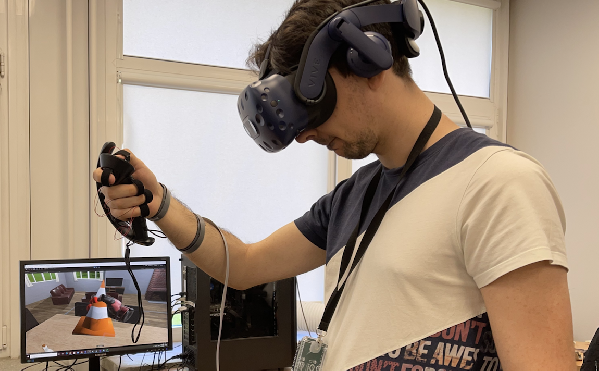A Multi-Modal Auditory-Visual-Tactile e-Learning Framework
Glad to see that the research work of my team is very much in line with Meta‘s push on haptics. Haptics is finally getting the attention it deserves.
Our team recently presented the following work: Filippo Sanfilippo, Tomas Blažauskas, Gionata Salvietti, Isabel Ramos, Silviu Vert, Jaziar Radianti, and Tim A. Majchrzak. Integrating VR/AR with Haptics into STEM Education. In Proceeding of the 4th International Conference on Intelligent Technologies and Applications (INTAP 2021), Grimstad, Norway. 2021.
Our team also developed a novel haptic-enabled framework for hands-on e-Learning. The framework enables a fully-immersive tactile, auditory, and visual experience. This is achieved by combining virtual reality (VR) tools, with a novel wearable haptic device, which is designed by augmenting a low-cost commercial off-the-shelf (COTS) controller with vibrotactile actuators.
This work was published: Filippo Sanfilippo, Tomas Blazauskas, Martynas Girdžiūna, Airidas Janonis, Eligijus Kiudys and Gionata Salvietti. A Multi-Modal Auditory-Visual-Tactile e-Learning Framework. In Proceeding of the 4th International Conference on Intelligent Technologies and Applications (INTAP 2021), Grimstad, Norway. 2021.
This work was awarded the Best Conference Paper at INTAP 2021.
This work is part of our European project titled Integrating virtual and AUGMENTED reality with WEARable technology into engineering EDUcation (AugmentedWearEdu), funded through the Call 2020 Round 1 KA2 - Cooperation for innovation and the exchange of good practices, Erasmus+. Partners: Kaunas University of Technology (KTU), Lithuania; University of Siena (UNISI), Italy; Universida de do Minho (UMinho), Portugal; University Politehnica Timișoara (UPT), Romania. https://augmentedwearedu.uia.no/
Special Issue "Advanced in Snake Robots of Bio-Inspired Robotics"
Dear colleagues,
In general, bio-inspired robotics are often regarded as mere biomimicry. However, just as airplanes do not flap their wings like birds and automobiles do not walk like horses, it is not always best to imitate the forms and movements of living creatures in the field of engineering. In other words, Bio-inspired Robotics and Biomimetic Robotics are not the same things. Similar problems exist in snake-like robots, where the initial inspiration may come from living organisms, but the final application may differ from the biological principles.
This Special Issue aims to present not only research on understanding animal snakes for biomimetic robots, but also research on new snake-like robots that are not limited to mere biomimicry while considering the real application. This Special Issue will provide an opportunity to introduce and share state-of-the-art research on snake robots by collecting cutting-edge research results of various bio-inspired robots. We look forward to the participation of researchers who are researching this field.
Prof. Dr. Shugen Ma
Dr. Atsushi Kakogawa
Dr. Chao Ren
Dr. Filippo Sanfilippo
Guest Editors
Manuscript Submission Information
Manuscripts should be submitted online at www.mdpi.com by registering and logging in to this website. Once you are registered, click here to go to the submission form. Manuscripts can be submitted until the deadline. All papers will be peer-reviewed. Accepted papers will be published continuously in the journal (as soon as accepted) and will be listed together on the special issue website. Research articles, review articles as well as short communications are invited. For planned papers, a title and short abstract (about 100 words) can be sent to the Editorial Office for announcement on this website.
Submitted manuscripts should not have been published previously, nor be under consideration for publication elsewhere (except conference proceedings papers). All manuscripts are thoroughly refereed through a single-blind peer-review process. A guide for authors and other relevant information for submission of manuscripts is available on the Instructions for Authors page. Sensors is an international peer-reviewed open access semimonthly journal published by MDPI.
Please visit the Instructions for Authors page before submitting a manuscript. The Article Processing Charge (APC) for publication in this open access journal is 2200 CHF (Swiss Francs). Submitted papers should be well formatted and use good English. Authors may use MDPI's English editing service prior to publication or during author revisions.
Keywords
- snake robot
- bio-inspired robotics
- multi-link mobile robots
- soft robotics
This special issue is now open for submission.
Special Issue "Intelligent Technologies and Robotics"
Dear Colleagues,
Robotics is progressing at a much faster pace than ever before. This progress is synergistically stimulated by the cross-cutting, transformational effects of artificial intelligence (AI) and intelligent technologies. It is crucial to foster a greater awareness of this co-creation process and to give adequate consideration to societal needs, sustainability perspectives, and accountability.
This Special Issue is open to interdisciplinary approaches, and it aims at exhibiting the latest research achievements, findings, and ideas in the areas of “Intelligent Technologies and Robotics”. The issue will contain revised and substantially extended versions of selected papers that were presented at the 4th International Conference on Intelligent Technologies and Applications (INTAP'21), but we also strongly encourage researchers unable to participate in the conference to submit articles for this call.
Papers are welcomed on topics that are related to intelligent technologies within the aspects of theory, design, practice, and applications for robotics, including, but not limited to:
- Machine and mechanism design
- Industrial IT
- Intelligent monitoring
- Robotics and vision
- Collaborative robots
- Urban ocean technology
- Haptics
- Theoretical and computational kinematics/dynamics
- Dynamics of machinery and multibody systems
- Control issues
- Machine intelligence
- Intelligent applications
- Educational robotics
Dr. Filippo Sanfilippo
Dr. Gionata Salvietti
Dr. Marco Aggravi
Guest Editors
Manuscript Submission Information
Manuscripts should be submitted online at www.mdpi.com by registering and logging in to this website. Once you are registered, click here to go to the submission form. Manuscripts can be submitted until the deadline. All papers will be peer-reviewed. Accepted papers will be published continuously in the journal (as soon as accepted) and will be listed together on the special issue website. Research articles, review articles as well as short communications are invited. For planned papers, a title and short abstract (about 100 words) can be sent to the Editorial Office for announcement on this website.
Submitted manuscripts should not have been published previously, nor be under consideration for publication elsewhere (except conference proceedings papers). All manuscripts are thoroughly refereed through a single-blind peer-review process. A guide for authors and other relevant information for submission of manuscripts is available on the Instructions for Authors page. Robotics is an international peer-reviewed open access quarterly journal published by MDPI.
Please visit the Instructions for Authors page before submitting a manuscript. The Article Processing Charge (APC) for publication in this open access journal is 1400 CHF (Swiss Francs). Submitted papers should be well formatted and use good English. Authors may use MDPI's English editing service prior to publication or during author revisions.
Submission page
Filippo Sanfilippo


